Tour de France 2023 stage guide – Schedule and key dates as Tadej Pogacar and Jonas Vingegaard chase yellow
The wait is almost over: on Saturday 1st July, the peloton will roll out of the Basque city of Bilbao to get the 110th edition of the Tour de France under way.
Jonas Vingegaard (Jumbo-Visma) and Tadej Pogacar (UAE Team Emirates) are the two main favourites to do battle for the yellow jersey. With the Danish defending champion in scintillating form during the Dauphine, it remains to be seen if the two-time winner from Slovenia can put up a serious challenge after breaking his wrist this spring.
The outsiders for the biggest race of the season include Enric Mas (Movistar), Simon Yates (Team Jayco-AlUla), Jai Hindley (Bora-Hansgrohe) and Mikel Landa (Bahrain Victorious), while Colombia’s Egan Bernal (Ineos Grenadiers) – the 2019 champion – makes his first appearance in the Tour since 2020 following a string of injuries.
Tour de France
How to watch the 2023 Tour de France
20 HOURS AGO
Home fans will get behind climbers Romain Bardet (Team DSM) and David Gaudu (Groupama-FDJ), the latter’s team-mate Thibaut Pinot making his final appearance in the Tour before retiring at the end of the season.
Three days in the Basque country will produce a lumpy and explosive start to a race that welcomes the Pyrenees early ahead of further mountain showdowns in the Massif Central, the Jura, the Alps and then the Vosges.
Four summit finishes include a return to the legendary Puy de Dôme in the Massif Central for the first time in 35 years as well as a Bastille Day showdown on the Grand Colombier, the climb where Bernal famously cracked on his last outing in the Tour in 2020.
With just 22.4km against the clock, only the 2015 Tour has had fewer time trial kilometres (13.8km) since TTs were first introduced in 1934. Contrary to recent years, there are also only two stages that break the 200km barrier.
Up to eight flat and fast finishes should keep the sprinters happy as Wout van Aert (Jumbo-Visma) defends the green jersey, Fabio Jakobsen (Soudal Quick-Step) returns alongside Jasper Philipsen (Alpecin-Deceuninck) and Caleb Ewan (Lotto-Dstny), Biniam Girmay (Intermarche-Circus-Wanty) makes his debut, and Mark Cavendish (Astana-Qazaqstan) targets the outright Tour de France stage win record.
A single triumph will see Manx veteran Cavendish move above Eddy Merckx in the all-time leaderboard with 35 wins – and the British champion will no doubt have Stage 7 to Bordeaux on his radar, 13 years after he took his 14th Tour stage win in the same city in the south-west on the race’s last visit to the wine capital of France.
TOUR DE FRANCE 2023 TV SCHEDULE AND ROUTE DETAILS
Key stages in bold and explained in detail below
| Stage | Date | Start / Finish | Distance |
| Stage 1 | Sat July 1 | Bilbao – Bilbao | 182km (Hills) |
| Stage 2 | Sun July 2 | Vitoria-Gasteiz – San Sebastian | 209km (Hills) |
| Stage 3 | Mon July 3 | Amorebieta-Etxano – Bayonne | 185km (Flat) |
| Stage 4 | Tue July 4 | Dax – Nogaro Circuit | 182km (Flat) |
| Stage 5 | Wed July 5 | Pau – Laruns | 165km (Mountains) |
| Stage 6 | Thu July 6 | Tarbes – Cauterets | 145km (Mountains) |
| Stage 7 | Fri July 7 | Mont de Marsan – Bordeaux | 170km (Flat) |
| Stage 8 | Sat July 8 | Libourne – Limoges | 201km (Hills) |
| Stage 9 | Sun July 9 | Saint-Leonard-de-Noblat – Puy de Dome | 184km (Mountains) |
| Rest day | Mon July 10 | – | – |
| Stage 10 | Tue Jul 11 | Parc Vulcania – Issoire | 167km (Hills) |
| Stage 11 | Wed Jul 12 | Clermont Ferrand – Moulins | 180km (Flat) |
| Stage 12 | Thu July 13 | Roanne – Belleville-en-Beaujolais | 169km (Hills) |
| Stage 13 | Fri July 14 | Chatillon-Sur-Chalaronne – Grand Colombier | 138km (Mountains) |
| Stage 14 | Sat July 15 | Annemasse – Morzine | 152km (Mountains) |
| Stage 15 | Sun July 16 | Les Gets – Saint Gervais | 180km (Mountains) |
| Rest day | Mon July 17 | – | – |
| Stage 16 | Tue July 18 | Passy – Combloux | 22km (ITT) |
| Stage 17 | Wed July 19 | Saint Gervais – Courchevel | 166km (Mountains) |
| Stage 18 | Thu July 20 | Moutiers – Bourg en Bresse | 186km (Hills) |
| Stage 19 | Fri July 21 | Moirans-en-Montagne – Poligny | 173km (Flat) |
| Stage 20 | Sat July 22 | Belfort – Le Markstein | 133km (Mountains) |
| Stage 21 | Sun July 23 | Saint-Quentin-en-Yvelines – Paris Champs-Elysees | 115km (Flat) |
TOUR DE FRANCE 2023 ROUTE MAP
TOUR DE FRANCE 2023 – Seven key stages
STAGE 1, JULY 1: BILBAO – BILBAO (182KM, HILLS)
There’s no prologue or rudimentary bunch sprint for the first day of this Tour. Instead, a hilly opener to and from Bilbao features 3,300m of vertical gain and includes the spiky Pike Bidea climb 10km from the finish, with an average gradient of 10% over 2km. Along with the preceding Vivero climb, these two tests often spice up the finale of the Circuito de Getxo race which, last year, was won by Juan Ayuso and, the year before, by Giacomo Nizzolo.
If Nizzolo’s win shows that not all sprinters will be ejected by the difficulty of the climbs, Ayuso’s suggests that we won’t see a normal fast finish to decide the race’s first yellow jersey. Indeed, with Stage 2 also a hilly affair to San Sebastien, we are not likely to see a bunch sprint until the race enters France and finishes at Bayonne on day three.
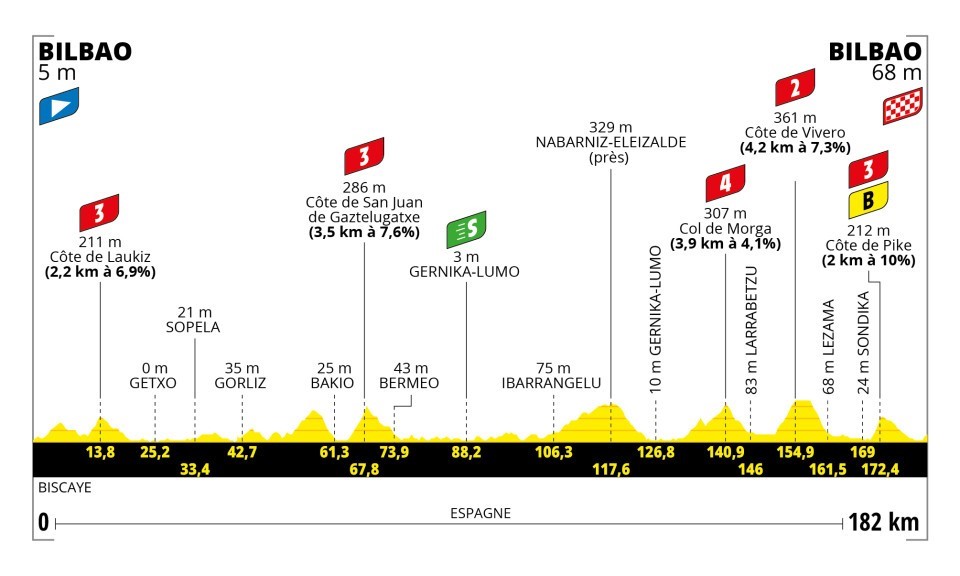
STAGE 6, JULY 6: TARBES – CAUTERETS-CAMBASQUE (145KM, HIGH MOUNTAINS)
The second day in the Pyrenees hinges on the infamous Aspin-Tourmalet combo ahead of the race’s first summit finish at Cauterets. The historic Col du Tourmalet (17.1km at 7.3%) is one of the most famous Tour ascents of all time and, perhaps, the only legendary ascent of the entire edition – although coming so far from the finish may dull its potential piquancy.
Still, if this short mountain stage is raced anything like the Granon stage at last year’s Tour, then we could see similar levels of activity on the Tourmalet as we saw on the Galibier in Stage 11 in 2022. It remains to be seen if any severe damage can be done on the final climb with its gentle average gradient of 5.4%.
But there’s a steep double-digit segment near the top of the 16km test to conclude what could be a pretty full-on day – so it’s not infeasible that some of the GC favourites look to make a big statement.
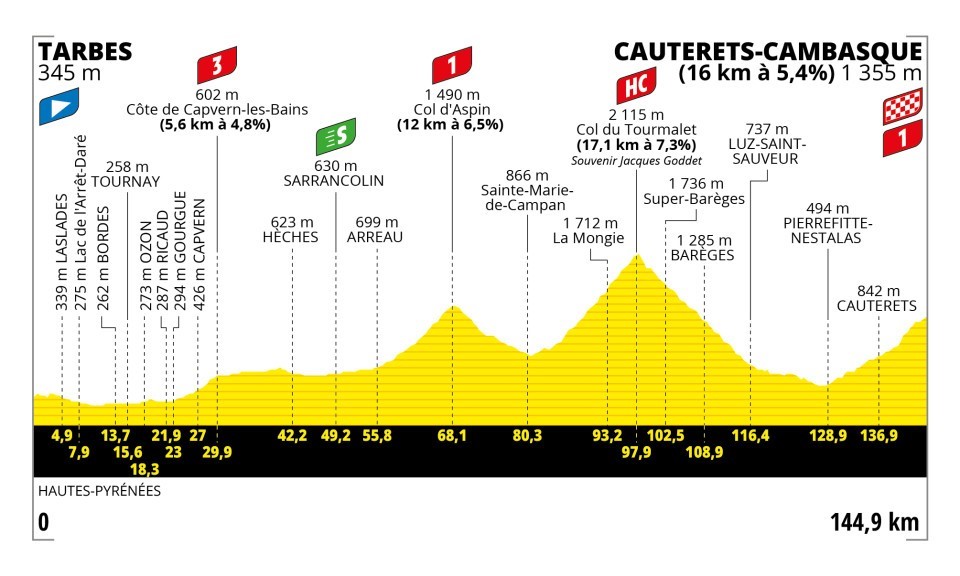
STAGE 9, JULY 9: SAINT-LEONARD-DE-NOBLAT – PUY DE DOME (182KM, MEDIUM MOUNTAINS)
Since the construction of a railway taking tourists to the summit of the now-extinct volcano in the Auvergne, it was thought that the Puy de Dôme’s time on the Tour was over. But 35 years after it hosted its last summit finish – won by the Dane Johnny Weltz – the climb will make its long-awaited return.
Over the years, the Puy de Dôme (13.3km at 7.7%) has played host to some notable battles – not least in 1964 when Jacques Anquetil and Raymond Poulidor went head-to-head, or in 1975 when Eddy Merckx was infamously punched in the kidneys by a spectator. The last 4.5km – likely to be closed to the public and team cars alike – boast double-digit gradients that should make this one of the stand-out stages of the race.
The Poulidor connection is also reflected in the start town of Saint-Leonard-De-Noblat, the Frenchman’s hometown until his death in 2019. Leg-sapping lumpy roads and three lower-category climbs precede the final climb, which will be the last slice of action before the first rest day.
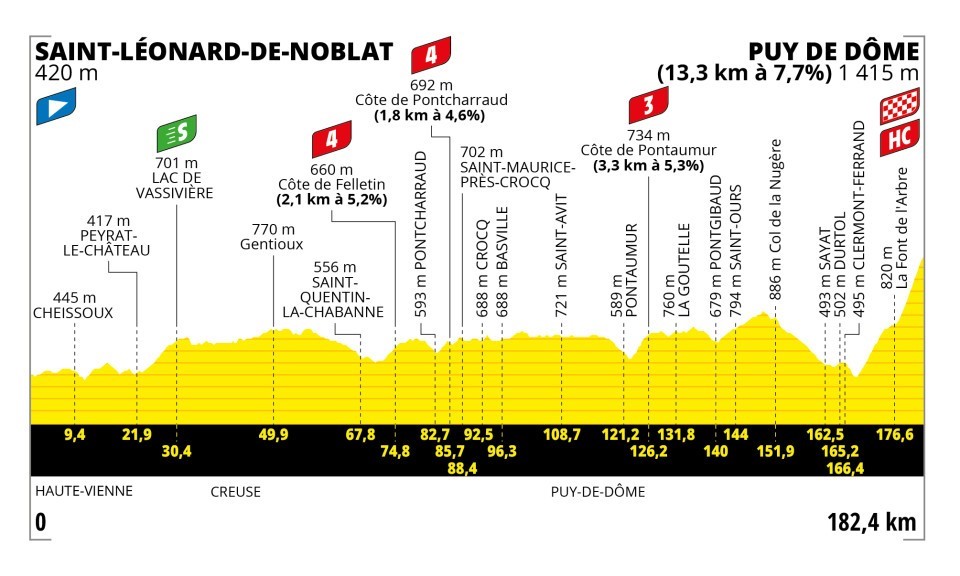
STAGE 13, JULY 14: CHATILLON-SUR-CHALARONNE – GRAND COLOMBIER (138KM, MOUNTAINS)
On the French national holiday of Quatorze Juillet the race enters the Jura mountains for a summit finish on the fearsome Grand Colombier (17.4km at 7.1%) where the then defending champion Egan Bernal (Ineos Grenadiers) cracked in 2020.
The sport’s landscape has changed dramatically since Bernal last rode the Tour, with Tadej Pogacar, Primoz Roglic and Jonas Vingegaard dominating the battle for yellow ever since. Still somewhat short of his best, Bernal will hope at least to bury his demons on what will be the first GC showdown of the second week.
What the Grand Colombier lacks in altitude (it’s only 1,501m high) it makes up in Galibier-level difficulty, 12% ramps, and wondrous views if the weather is playing ball. And given this is a short stage without any serious obstacles until the final climb, we could see fireworks.
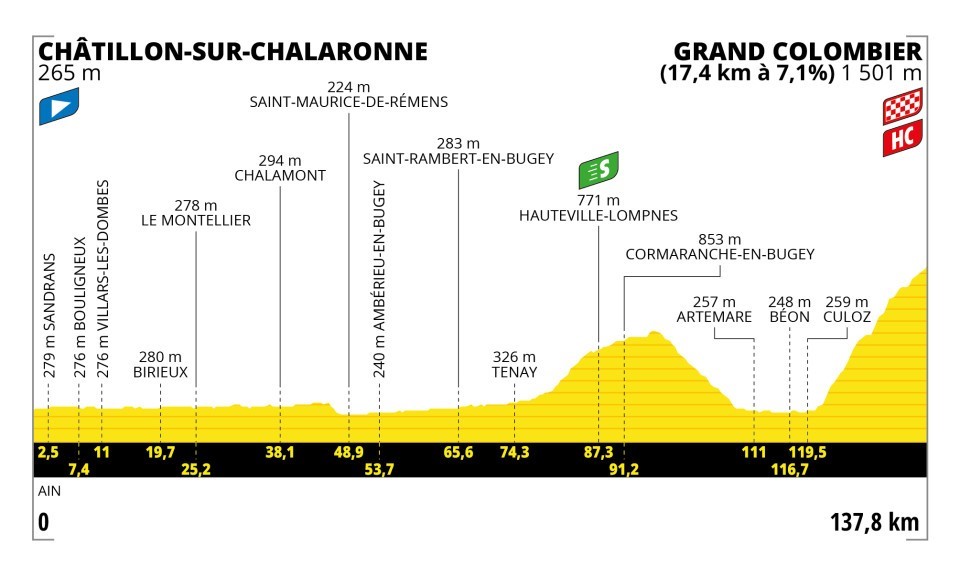
STAGE 16, JULY 18: PASSY – COMBLOUX (22.4KM, ITT)
The only race against the clock of the entire race is a lumpy affair with two climbs, the short Cote de la Cascade de Coeur and then the longer, steeper Cote de Domancy (2.5km at 9.4%) above Sallanches. The road continues uphill towards the finish in what will be a TT that doesn’t suit the purists like Filippo Ganna and Stefan Kung.
The route uses some of the roads from the deciding TT in the 2016 Tour, which was won by Chris Froome ahead of Tom Dumoulin and Fabio Aru. Both Pogacar and Vingegaard will relish donning a yellow skin suit for this. Ditto Wout van Aert, in all likelihood – although his may be green.
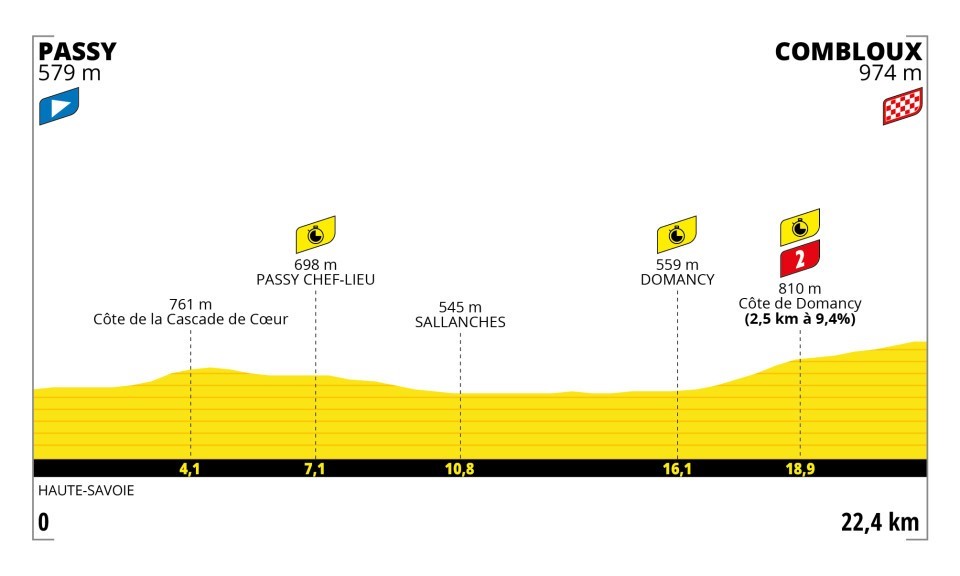
STAGE 17, JULY 19: SAINT-GERVAIS MONT-BLANC – COURCHEVEL (166KM, HIGH MOUNTAINS)
If the first two days in the Alps, which come before the time trial and second rest day, are challenging, then this third day is probably the pick of the bunch. Only 166km long but with over 5,000m of climbing, Stage 17 is arguably the queen stage of the Tour and features the Col des Saisies, Cormet de Roselend and Cote de Longefoy (with its technical descent of over 30 hairpins) ahead of the longest – and possibly toughest – climb of the race.
Used for the first time in 2020 when Miguel Angel Lopez took the win, the fearsome Col de la Loze (28.1km at 6%; the Prix Henri Desgrange) returns to give Stage 17 a severe sting in the tail. The climb drags up through Meribel before becoming Europe’s most arduous cycling path which pitches and ramps up without any forgiving corners towards a 20% wall near the top.
The race is not over at the summit, though, with a steep and narrow drop towards the finish on the altiport at Courchevel. It’s unclear how this technical downhill segment will be raced following the tragic death of Switzerland’s Gino Mader following his crash towards the finish of Stage 5 of the Tour de Suisse.
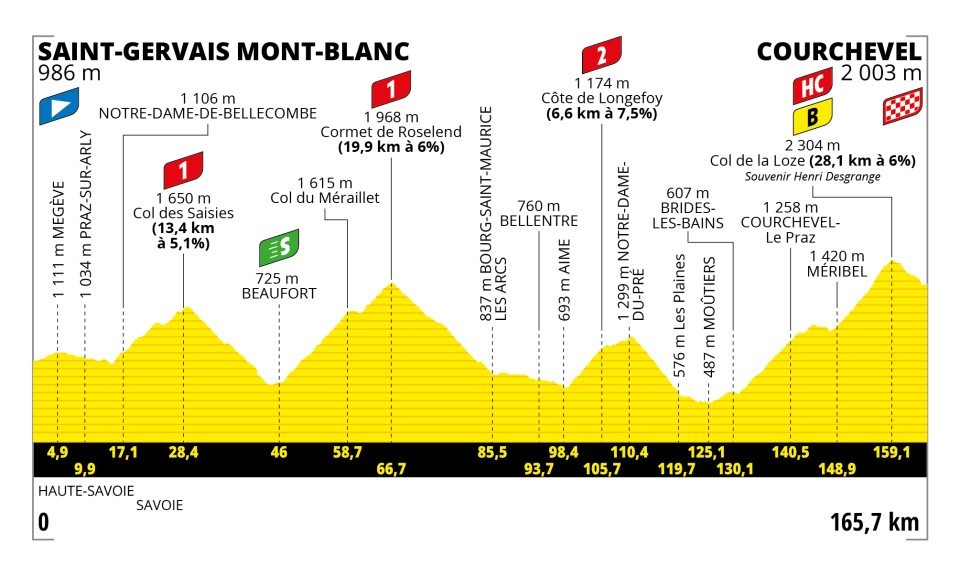
STAGE 20, JULY 22: BELFORT – LE MARKSTEIN FELLERING (133.5KM, MEDIUM MOUNTAINS)
After stages suited to the sprinters and breakaway specialists alike, the penultimate day of the race plays out in this short 133.5km dash across the Vosges. Five climbs – including the Cat.1 Petit Ballon (9.3km at 8.1%) – precede the final ascent of the race, the Platzerwaswel side of the Grand Ballon.
The finish borrows from the Le Tour Femmes finale last summer and comes at Le Markstein over 8km from the summit of the last climb – a parcours quirk that could either add some tension or burst the bubble early depending on how the stage is ridden and how much there is still left to fight for in the battle for yellow.
While none of the climbs are super tough, the succession of peaks and troughs – and very little downtime between each of the day’s tests – could combine to make this an eye-catching stage for spectators. It culminates a three-week race which should be decided not so much by the route but by the riders and how they attack what appears to be a parcours that goes against the grain of recent Tour offerings.
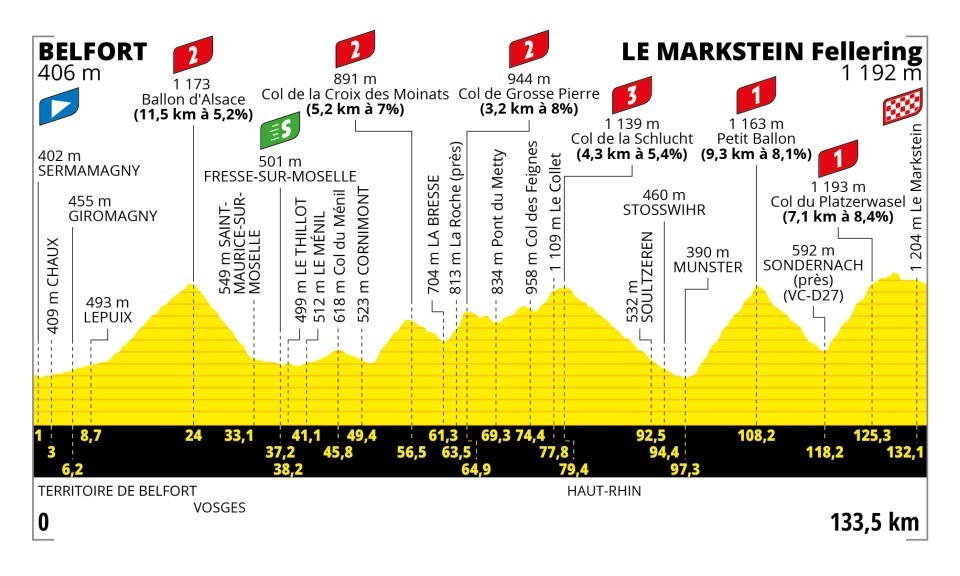
Our Tour de France preview series will continue with a team guide and a comprehensive yellow jersey guide complete with predictions and things to keep an eye open for during the 110th edition of the race.
– – –
Tour de France
Pinot selected for final Tour de France, Demare omitted – ‘I’m angry and disheartened’
13/06/2023 AT 20:10
Tour de France
Vingegaard warns Tour rivals he can get ‘better’ as Pogacar steps up preparation
12/06/2023 AT 08:03
Read the full article Here


